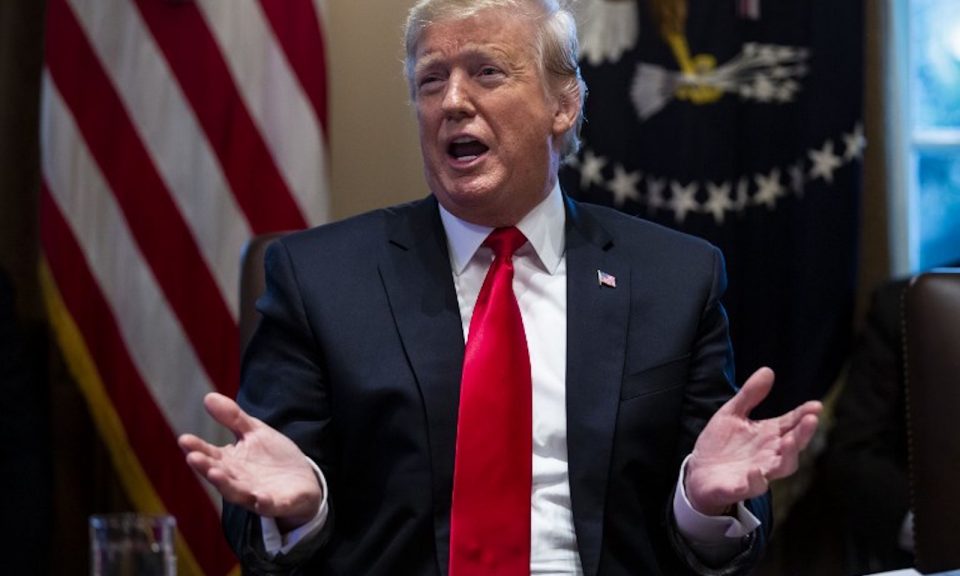Subscripe to be the first to know about our updates!

Asia Stumbles into Year of the Currency War
WILLIAM PESEK
By his own metrics, US President Donald Trump is losing the trade war, and humiliatingly so. Sure, China’s gross domestic product is taking big hits, no matter what Beijing admits in official data.
Trends in exports, fixed-asset investment, purchasing managers’ orders and Apple Inc’s earnings are all evidence of a marked downshift in mainland activity.
But Trump had three goals in mind when he slapped tariffs on US$250 billion of Chinese goods – two in the short run, one for the longer term. The first two were a big reversal in trade-deficit trends and a celebratory Wall Street rally. The long-term objective was halting China’s designs on dominating tech and other key sectors by 2025.
And yet, Washington’s monthly imbalance with Beijing just hit a record high. Through October, US exports to China were down almost $1 billion from a year earlier, worth about $102 billion. What’s more, Washington’s overall deficit with the world is on track to surge by $100 billion on Trump’s watch since early 2017.
Lehman Brothers crisis
In 2018, the Dow Jones Industrial Average posted its worst loss since 2008, the year of the Lehman Brothers crisis.
Goal number three of stopping China’s rise in its tracks isn’t happening. As China’s President Xi Jinping made clear in his New Year’s speech, the reform drive will not “stagnate.” In other words, the ambitious “Made in China 2025” plan that Trump fears remains on track.
As the trade war comes up short, Trump is ramping up the next theater of conflict: the currency markets.
Trump gave some of the battle plan away with his assault on the Federal Reserve. He spent much of December slamming hand-picked Fed Chairman Jerome Powell for tightening too much, going so far as calling the world’s most powerful monetary authority “crazy.”
That, predictably, deepened the stock rout. Never before has a White House so publicly slammed a Fed that, by design, is independent of political meddling. Yet the real worry is what’s behind Trump’s Fed-bashing – anger over a strong dollar.
During the last two years, Trump made no secret of his belief that exchange rates are “killing us.” And that governments from Beijing to Tokyo to Seoul were engineering trade advantages at the expense of US workers. Yet his rhetoric wasn’t backed up with action.
True, Treasury Secretary Steve Mnuchin effectively declared an end to the 24-year-old strong dollar policy in January 2018. The White House quickly backtracked as markets quaked.
In 2019, expect a new currency push. One motivation: US growth is losing momentum. Trump is anxious to keep the key source of his legitimacy humming along. The bigger objective, though, is reminding Asia who’s boss.
Xi’s China is the main target. But so are Japan’s Shinzo Abe and South Korea’s Moon Jae-in, both of whom are grappling with slowing growth.
Though Abe is his best pal among world leaders, Trump is annoyed that Tokyo is delaying free-trade negotiations. Desperate for a win on the global stage, any win, Trump views getting Japan to import more American cars as the best option.
Lack of progress
Trump has cooled on Moon because of a lack of progress on North Korean denuclearization. Not that this is Moon’s job. Still, Trump’s vassal-state worldview leaves him disappointed that Moon hasn’t negotiated peace with Kim Jong Un – giving Trump the credit, of course.
All this leaves Japan and South Korea uniquely vulnerable to the weaker dollar Trump is determined to deliver. Even now, Abe and Moon face export headwinds. Both face disappointment about the lack of success in upping wages, productivity and competitiveness that is denting their approval numbers. Both also face the specter of Trump’s demands for non-manipulation agreements on currencies.
That’s code for a new “Plaza Accord,” of sorts. That 1985 deal, in a New York hotel Trump owned for a time, devalued the dollar against the yen. In the second half of his term, Trump is set on getting China, Japan and South Korea to acquiesce to stronger exchange rates to give him a much-needed victory.
Given that Democrats now control the House of Representatives, Trump’s legislative prospects are effectively dead. He will rely on executive actions to change the narrative from the scandals and investigations clouding his presidency. The easiest levers are intensifying the trade war and monkeying with exchange rates.
It’s time, in other words, to buckle those seatbelts as 2019 begins – and Trump’s war expands to Asian currencies.
Source; Asia Times